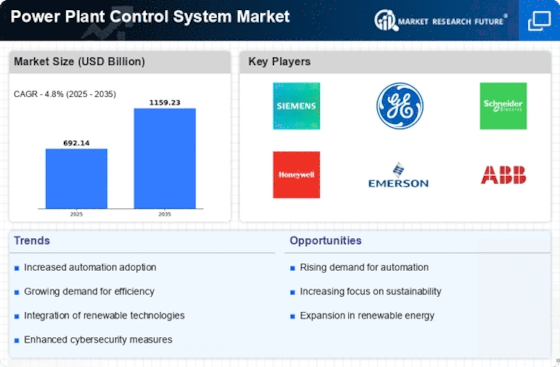Market Trends
Key Emerging Trends in the Power Plant Control System Market
The Power Plant Control System market is undergoing dynamic changes, influenced by various factors that shape its trends and trajectory. One prominent trend is the growing emphasis on digitization and automation in power generation facilities. As industries strive for greater efficiency and reduced operational costs, there is a notable shift towards adopting advanced control systems that leverage cutting-edge technologies.
With the rise of the Industrial Internet of Things (IIoT), power plants are increasingly integrating smart sensors and devices to collect real-time data. This data is then utilized by sophisticated control systems to optimize plant operations. This trend not only enhances overall efficiency but also enables predictive maintenance, minimizing downtime and improving the reliability of power generation.
Furthermore, the integration of artificial intelligence (AI) and machine learning (ML) in power plant control systems is gaining traction. These technologies empower control systems to analyze vast amounts of data, identify patterns, and make informed decisions in real-time. The application of AI and ML in power plants enhances predictive analytics, fault detection, and adaptive control, leading to more responsive and self-optimizing power generation processes.
Environmental concerns and the push for sustainable energy solutions are also influencing market trends in power plant control systems. Governments and industries worldwide are increasingly investing in renewable energy sources such as solar, wind, and hydropower. As a result, power plant control systems are evolving to accommodate the complexities of integrating diverse energy sources into the grid. This includes developing smart grid solutions that can efficiently manage the fluctuating nature of renewable energy production.
Cybersecurity has emerged as a critical aspect of power plant control system trends. As control systems become more interconnected and reliant on digital technologies, the vulnerability to cyber threats also rises. Power plant operators are prioritizing robust cybersecurity measures to safeguard critical infrastructure from potential cyber-attacks. This includes implementing advanced encryption, firewalls, and intrusion detection systems to ensure the resilience of power plant control systems.
The market is also witnessing a trend towards modular and scalable control system solutions. Power plants are increasingly looking for flexible control systems that can be easily upgraded or expanded to accommodate changes in plant configurations or capacity. This modular approach allows for cost-effective system upgrades and ensures that power plants can adapt to evolving operational requirements without significant disruptions.
Additionally, there is a growing focus on user-friendly human-machine interfaces (HMIs) in power plant control systems. As the complexity of control systems increases, there is a need for intuitive interfaces that enable operators to monitor and control processes efficiently. User-friendly HMIs enhance situational awareness, reduce the likelihood of human errors, and contribute to overall plant safety and productivity.
The Power Plant Control System market is witnessing a transformation driven by digitization, artificial intelligence, sustainability initiatives, cybersecurity, modular solutions, and user-friendly interfaces. These trends collectively contribute to the evolution of power generation facilities, ensuring they remain at the forefront of technological advancements while meeting the challenges of an ever-changing energy landscape. As the industry continues to innovate, power plant control systems will play a pivotal role in shaping the future of efficient and sustainable energy generation.



















Leave a Comment